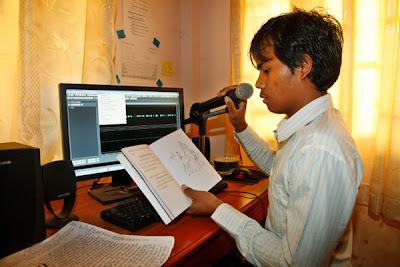 |
| Rorchom Saroeun, a 20-year-old ethnic Jarai radio announcer, broadcasts during a program for ethnic minority communities on FM 95.5 in Ratanakkiri province. Photograph: Heng Chivoan/Phnom Penh Post |
May Titthara
The Phnom Penh Post
‘Mae Mang Kit Sith Ngay Panes Laek Ra Kornong Pades Krae” in the mother tongue of the ethnic Tumpoun minority translates to “global human rights affairs”,
which is exactly what the Voice of Ethnic Minority Communities radio
program has been bringing to the most isolated ethnic communities in
Ratanakkiri since 2007.
The radio program broadcasts in four languages – Jarai, Tumpoun, Kreung and Prao – for two hours, five days a week, and program president Eoun Som Ath said there was increasing demand for more air time.
“If possible, I want to add more broadcasting hours, because it
is a significant program for the ethnic minorities to learn about
health issues, agricultural methods and their own traditions,” he said.
A small team of reporters working for the program spend eight days a
month reporting in some of the most secluded and remote areas in the
Kingdom to bring current affairs discussion from communities speaking
one of the four languages to the program, which is broadcast on the
National Radio.
Rorchom Saroeun, 20, sits silently as he carefully translates
verbally spoken Jarai language – his own ethnic mother tongue – into a
phonetically compatible Khmer-language written statement to be read by
the broadcaster on Voice of Ethnic Minorities.
Saroeun, who is one of the field reporters for the program, said ethnic villagers are often too shy to be interviewed for radio because they feel ashamed of their poor oratory skills.
His reporting missions often take him deep into the jungles and
plantations of Ratanakkiri to find and learn about the ethnic
communities.
“I can put up with the difficulty [to secure interviews] for the benefit of the ethnic minorities,” Saroeun said.
Over the five days, the program covers education, health, agriculture, culture and law issues relevant to the ethnic minorities.
Kreung ethnic minority Keus Davy, 20, an agriculture journalist for
the program, said the Kreung communities benefited greatly from
education in their mother tongue.
“I am very happy when I see many ethnics listening to my radio
program. If this project is stopped one day, it will seriously affect
them because they lose the right to get information,” she said.
The prospect of the operation collapsing in the face of funding
shortages is a very real fear for program president Som Ath, who has not
yet heard whether UNESCO, which has funded the program since its
inception in 2007, will renew funding for 2013.
“In 2010, we used to stop our operation due to budget shortages. I am
worried we will not be able to resume our operations anymore in 2013 if
the donors don’t continue their fund,” he said.
For 18-year-old Tumpoun minority Soeung Kora, the program provides a
two-pronged benefit: an understanding of and an appreciation for modern
technologies, such as sanitation and healthcare, and on the other hand,
an understanding of and an appreciation for traditional culture, such as
ceremonies and rituals.
Conversing in the Tumpoun language as she sold fruit brought from her
family’s plantation, she said her family had advanced greatly from
agricultural know-how broadcast on the program in their language.
“The Voice of Ethnic Minority Communities program is very useful for
the illiterate people. Without this program, we can’t listen to others,
because we know Khmer language well but the elders will get no
information in the province,” she said.
Dam Chanthy, the female president of the Highlander’s Association,
who is a Tumpoun staffer focusing on land rights education to that
ethnic minority in Ratanakkiri province, said she witnessed progress in
leaps and bounds after the radio was launched in ethnic language.
She added that remarkable attitude changes had occurred in the
spheres of health and education, with the program encouraging villagers
to seek out medicinal assistance at hospitals when they were sick and to
send their children to school.
UNESCO chief of mission Anne Lemaistre told the Post by email
yesterday that the program would be funded through until the end of
2012.
“It is indeed a very nice project Unesco is proud to have launched
and has been supporting for three years now,” she said. “Unesco is
working to ensure the funding next year too.”

No comments:
Post a Comment